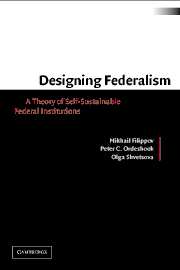Book contents
- Frontmatter
- Contents
- List of Figures
- List of Tables
- Preface
- Acknowledgments
- 1 Federations and the Theoretical Problem
- 2 Federal Bargaining
- 3 Two Cases of Uninstitutionalized Bargaining
- 4 Representation
- 5 Incentives
- 6 Political Parties in a Federal State
- 7 Institutional Sources of Federal Stability I
- 8 Institutional Sources of Federal Stability II
- 9 Designing Federalism
- References
- Name Index
- Subject Index
- References
References
Published online by Cambridge University Press: 03 December 2009
- Frontmatter
- Contents
- List of Figures
- List of Tables
- Preface
- Acknowledgments
- 1 Federations and the Theoretical Problem
- 2 Federal Bargaining
- 3 Two Cases of Uninstitutionalized Bargaining
- 4 Representation
- 5 Incentives
- 6 Political Parties in a Federal State
- 7 Institutional Sources of Federal Stability I
- 8 Institutional Sources of Federal Stability II
- 9 Designing Federalism
- References
- Name Index
- Subject Index
- References
- Type
- Chapter
- Information
- Designing FederalismA Theory of Self-Sustainable Federal Institutions, pp. 337 - 366Publisher: Cambridge University PressPrint publication year: 2004



